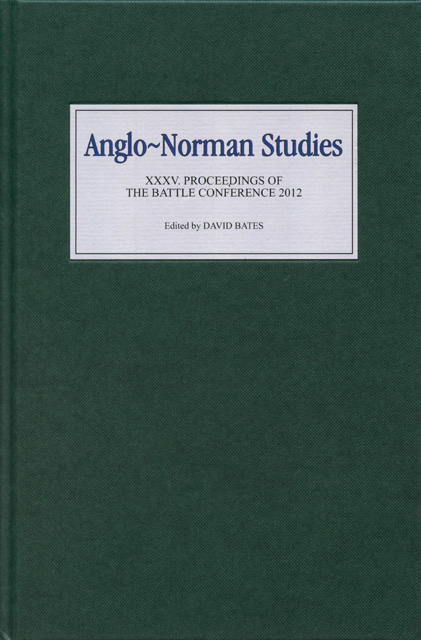Book contents
- Frontmatter
- Dedication
- Contents
- List of Illustrations and Tables
- Editor’s Preface
- Abbreviations
- A Three-Cornered Dynamic of Redemption in the ‘Long’ Thirteenth Century: Villein Manumissions and the Theology of the Incarnation (The R. Allen Brown Memorial Lecture, 2011)
- Femmes en religion, personnes d’autorité: les abbesses normandes (XIe–XIIIe siècles) (The R. Allen Brown Memorial Lecture, 2012)
- The Role of the Curator of the Bayeux Tapestry
- Early Normandy
- The Norman Conquest, Countess Adela, and Abbot Baudri
- Baldric of Bourgueil and the Flawed Hero
- John Bilson (1856–1943) and the Study of Anglo-Norman Romanesque
- The Identity of the Designer of the Bayeux Tapestry
- The Pseudo-Hugh Falcandus in His Own Texts
- The Thirteenth-Century Chronique de Normandie
- Les investitures abbatiales en Normandie: quelques réflexions autour du cas de l’abbaye du Bec-Hellouin (1034–1136)
- Robert Curthose: The Duke Who Lost His Trousers
- Sufficientia: A Horatian Topos and the Boundaries of the Self in Three Twelfth-Century Poems
- Aristocratic Acta in Normandy and England, c. 1150–c. 1250: The Charters and Letters of the Du Hommet Constables of Normandy
- Crime without Punishment: Medieval Scottish Law in Comparative Perspective
- Landscape and Belief in Anglo-Norman England
- Contents of Volumes 1–34
The Pseudo-Hugh Falcandus in His Own Texts
Published online by Cambridge University Press: 28 February 2023
- Frontmatter
- Dedication
- Contents
- List of Illustrations and Tables
- Editor’s Preface
- Abbreviations
- A Three-Cornered Dynamic of Redemption in the ‘Long’ Thirteenth Century: Villein Manumissions and the Theology of the Incarnation (The R. Allen Brown Memorial Lecture, 2011)
- Femmes en religion, personnes d’autorité: les abbesses normandes (XIe–XIIIe siècles) (The R. Allen Brown Memorial Lecture, 2012)
- The Role of the Curator of the Bayeux Tapestry
- Early Normandy
- The Norman Conquest, Countess Adela, and Abbot Baudri
- Baldric of Bourgueil and the Flawed Hero
- John Bilson (1856–1943) and the Study of Anglo-Norman Romanesque
- The Identity of the Designer of the Bayeux Tapestry
- The Pseudo-Hugh Falcandus in His Own Texts
- The Thirteenth-Century Chronique de Normandie
- Les investitures abbatiales en Normandie: quelques réflexions autour du cas de l’abbaye du Bec-Hellouin (1034–1136)
- Robert Curthose: The Duke Who Lost His Trousers
- Sufficientia: A Horatian Topos and the Boundaries of the Self in Three Twelfth-Century Poems
- Aristocratic Acta in Normandy and England, c. 1150–c. 1250: The Charters and Letters of the Du Hommet Constables of Normandy
- Crime without Punishment: Medieval Scottish Law in Comparative Perspective
- Landscape and Belief in Anglo-Norman England
- Contents of Volumes 1–34
Summary
Who is Hugh Falcandus? The Status quaestionis as to his identity
Despite the thousands of pages written on the subject by scholars over the last two centuries, the identity of the author of the Liber de regno Sicilie and Epistola ad Petrum Panormitane Ecclesie thesaurarium remains a mystery. Here I refrain from summarizing the full history of work on the subject, referring readers to the works of Jamison, Fuiano, da De Lellis, Loud, and Hood. Having presented the main points of the problem, beginning with the limited data available, I am going to attempt to shed light on this intricate topic.
As no author is named in the manuscripts, the name Hugh Falcandus (Hugo Falcandus) is transmitted by the principal editor of the Liber, Martin Gervais of Tournay, based on the manuscript given to him by Matthew Longuejoue, bishop of Soissons (1534–57), now lost. Most scholars agree that Hugh Falcandus is not the author’s name, but perhaps the name of the man to whom the manuscript belonged (Matthew Longjoue’s predecessor as bishop of Soissons was named Foucauld de Bonneval). The real hunt for the anonymous author’s identity started in the eighteenth century, and the main thesis can be represented as follows:
The hypothesis on the canon Falcus is apodictic. Jamison believed it was impossible to ascribe the authorship to Hugh Foucaut, abbot of Saint-Denis. Robert of San Giovanni cannot be the author of the Liber or Epistola because he was dead by 1185, and the Epistola was written in the spring of 1190. The hypothesis in favour of Admiral Eugenius was over-elaborate, and has not subsequently been supported by scholars. In 2008 Alexander Franke identified the anonymous author as Peter of Blois, but this is impossible, as I demonstrated in 2006: Peter left Sicily in the summer of 1168, whereas the anonymous author says he saw the earthquake in east Sicily on 4 February 1169 with his own eyes.
Further consideration supports the hypothesis that the author could be identified with Hugh (V) Foucaut, abbot of Saint-Denis, who died in 1197: this possibility was explored again recently by Gwyneth Hood (although the arguments seem somewhat weak) and last year by Ralph Kohn.
- Type
- Chapter
- Information
- Anglo-Norman Studies 35Proceedings of the Battle Conference 2012, pp. 141 - 162Publisher: Boydell & BrewerPrint publication year: 2013
- 1
- Cited by



